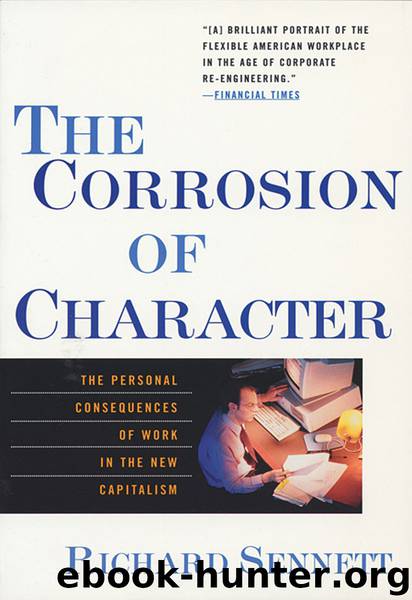The Corrosion of Character by Richard Sennett

Author:Richard Sennett
Language: eng
Format: epub
Publisher: W. W. Norton & Company
Published: 1998-08-16T16:00:00+00:00
THIS ELEMENTAL STORY, however, might have a different coloring in a different society. The sociological dimension of Rose’s exposure to risk lies in how institutions shape an individual’s efforts to change his or her life. We have seen some of the reasons that modern institutions are not themselves rigid and clearly defined; their uncertain character arises through taking aim at routine, through emphasizing short-term activities, through creating amorphous, highly complex networks in place of military-style bureaucracies. Rose’s risk-taking occurred in a society seeking to deregulate both time and space.
Risk is a matter of moving from one position to another. One of the most powerful analyses of movement in modern society has come from the sociologist Ronald Burt. The title of one of his books, Structural Holes, suggests the peculiarity of changing places in a loose organization; the more gaps, detours, or intermediaries between people in a network, the easier it is for individuals to move around. Uncertainty in the network abets the chances for movement; an individual can take advantage of opportunities not foreseen by others, can exploit weak controls by central authority. The “holes” in an organization are the sites of opportunity, not the clearly defined slots for promotion in a traditional bureaucratic pyramid.
Of course, sheer chaos cannot alone be the risk-taker’s friend. The sociologist James Coleman notes that people must draw upon a fund of social capital—shared past experiences as well as individual achievements and endowments—to help navigate a loose network. Other sociologists of network mobility emphasize that a person who presents himself or herself to a new employer or work group has to be attractive as well as available; risk involves more than simply opportunity.63
Burt’s work points to an important human fact also conveyed concretely by the court at Davos: the good risk-taker has to dwell in ambiguity and uncertainty. The men of Davos have proved themselves at home in this condition. Less powerful individuals who try to exploit ambiguity wind up feeling exiles. Or, in moving, they lose their way. In flexible capitalism, the disorientation entailed in moving toward uncertainty, toward those structural holes, occurs in three specific ways: through “ambiguously lateral moves,” “retrospective losses,” and unpredictable wage outcomes.
As pyramidal hierarchies are replaced by looser networks, people who change jobs experience more often what sociologists have called “ambiguously lateral moves.” These are moves in which a person in fact moves sideways even while believing he or she is moving up in the loose network. This crablike motion occurs, the sociologist Manuel Castells argues, even though incomes are becoming more polarized and unequal; job categories are becoming more amorphous.64 Other students of social mobility emphasize what are called “retrospective losses” in a flexible network. Since people who risk making moves in flexible organizations often have little hard information about what a new position will entail, they realize only in retrospect they’ve made bad decisions. They wouldn’t have taken the risk if only they’d known. But organizations are so often in a state of internal flux that it’s
Download
This site does not store any files on its server. We only index and link to content provided by other sites. Please contact the content providers to delete copyright contents if any and email us, we'll remove relevant links or contents immediately.
| Elections & Political Process | Ideologies & Doctrines |
| International & World Politics | Political Science |
| Public Affairs & Policy | Specific Topics |
| United States |
The Secret History by Donna Tartt(19090)
The Social Justice Warrior Handbook by Lisa De Pasquale(12190)
Thirteen Reasons Why by Jay Asher(8912)
This Is How You Lose Her by Junot Diaz(6887)
Weapons of Math Destruction by Cathy O'Neil(6281)
Zero to One by Peter Thiel(5802)
Beartown by Fredrik Backman(5755)
The Myth of the Strong Leader by Archie Brown(5508)
The Fire Next Time by James Baldwin(5446)
How Democracies Die by Steven Levitsky & Daniel Ziblatt(5219)
Promise Me, Dad by Joe Biden(5154)
Stone's Rules by Roger Stone(5088)
A Higher Loyalty: Truth, Lies, and Leadership by James Comey(4964)
100 Deadly Skills by Clint Emerson(4926)
Rise and Kill First by Ronen Bergman(4789)
Secrecy World by Jake Bernstein(4753)
The David Icke Guide to the Global Conspiracy (and how to end it) by David Icke(4720)
The Farm by Tom Rob Smith(4514)
The Doomsday Machine by Daniel Ellsberg(4490)
